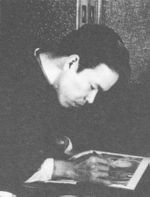Difference between revisions of "Toshiyuki Suma"
| Line 6: | Line 6: | ||
==Alternate Name(s)== | ==Alternate Name(s)== | ||
| − | [http://smpedia.com/index.php?title=須磨利之 須磨利之](Japanese), [[Reiko Kita]], [[Kou Minomura]], Eijiro Takenaka<ref group="">Painted in the style of Eitaro Takenaka.</ref>, etc. (See below) | + | [http://smpedia.com/index.php?title=須磨利之 須磨利之](Japanese), [[Reiko Kita]], [[Kou Minomura]], Eijiro Takenaka<ref group="">Painted in the style of Eitaro Takenaka. Years later, Suma was visited by Eitaro Takenaka's son, the critic Tsutomu Takenaka.</ref>, etc. (See below) |
===[http://www.nawapedia.com/index.php?title=Kitan_Club Kitan Club] aliases<ref group="">Chimuo Nureki, <u>The Artists of Kitan Club</u> (Kawade Shobo Shinsha, 2004)</ref>=== | ===[http://www.nawapedia.com/index.php?title=Kitan_Club Kitan Club] aliases<ref group="">Chimuo Nureki, <u>The Artists of Kitan Club</u> (Kawade Shobo Shinsha, 2004)</ref>=== | ||
Revision as of 22:09, 19 April 2010
Suma (須磨) family name, Toshiyuki (利之) first name, (1920- 1992)
Contents
Activities
Painter/illustrator, rope artist, writer and editor. Suma did editorial work in early SM magazines like "Kitan Club," "Uramado," "SM Collector," "Abu-Hunter" and "SM Kitan." He played an important role in the formation of post-war SM culture and left behind first-class work as a writer and rope artist.
Alternate Name(s)
須磨利之(Japanese), Reiko Kita, Kou Minomura, Eijiro Takenaka[1], etc. (See below)
Kitan Club aliases[2]
Reiko Kita、壬生すみ子(writer)、藤安節子(writer)、竹中えいじろ(artist)、今幾久造(artist)、花山剣作(writer)、鬼山絢作(consultant, writer)、赤坂剛(writer)、秋山ルミ子(writer)、三村幾夫(writer)、染田玄(writer). Art signed as "MINOMURA," "晃," "KEN," "弱" and "えいじろ."
Fuzoku Soushi aliases
Uramado aliases
SM magazine aliases
(Incomplete)
Biography
Since it is believed that Suma's autobiographies include a few invented anecdotes, the biographical data below could contain inaccuracies. Therefore, the following biography may be corrected in the future.
1920, Suma was born in Kyoto to a family who ran a printing business out of their home[3].
ca1932, As a child, he encountered Seiu Itou's torment art in the book "Documentation on Abnormal Customs, " which he found in his grandfather's book collection[4].
Selected Works
Notes
- ↑ Painted in the style of Eitaro Takenaka. Years later, Suma was visited by Eitaro Takenaka's son, the critic Tsutomu Takenaka.
- ↑ Chimuo Nureki, The Artists of Kitan Club (Kawade Shobo Shinsha, 2004)
- ↑ After his father's death, Suma's uncle, Kanbee Suma, became the head of the family.
- ↑ Fuji Akio, Masami Akita, Chimuo Nureki, Japanese Kinbaku Photo History 1 (Jiyukokuminsha, 1996)
References
